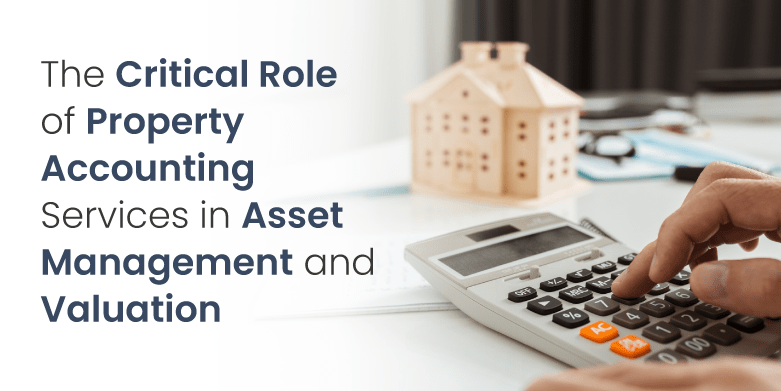Effective asset management is essential for sustainable growth and competitiveness in today’s business landscape. Property accounting services play a crucial role in this domain, facilitating accurate valuation, efficient resource allocation, and regulatory compliance. In this blog, we explore the pivotal significance of property accounting services, highlighting their role in advanced asset management techniques and their contributions to accurate valuation, regulatory adherence, and risk mitigation. Let’s uncover how property accounting services drive business success and maximize asset potential.
Importance of Property Accounting Services in Asset Management
Property accounting services are integral to effective asset management, particularly for real estate and fixed assets. These services encompass financial and regulatory activities aimed at ensuring accurate valuation, efficient resource allocation, and compliance with standards and regulations. By providing accurate asset valuation, insights into resource allocation, and assistance with regulatory compliance, property accounting services enable businesses to make informed decisions, optimize operational efficiency, and mitigate risks, ultimately contributing to long-term success and sustainability.
Advanced Asset Management Techniques
In asset management, businesses face increasing complexities and challenges in maximizing the value and performance of their assets. Advanced asset management techniques have become imperative to address these challenges effectively. By implementing these three key pillars of advanced asset management techniques businesses can enhance their decision-making processes, optimize resource allocation, and mitigate risks effectively.
Strategic Asset Allocation
Strategic asset allocation is the process of optimizing the mix of assets within a portfolio to achieve specific investment objectives while managing risk. It involves two crucial aspects:
- Optimizing Portfolio Mix: Strategic asset allocation aims to strike the right balance between various asset classes such as equities, fixed income, real estate, and alternatives. By diversifying across asset classes with different risk-return profiles, investors can enhance portfolio resilience and long-term performance.
- Risk Management Strategies: Effective risk management is integral to strategic asset allocation. This includes identifying, measuring, and mitigating risks associated with different asset classes and investment strategies.
Performance Monitoring and Reporting
Performance monitoring and reporting are essential components of advanced asset management, enabling businesses to track the performance of their assets and make informed decisions. Key aspects include:
- Real-Time Data Analysis: With the proliferation of data and technological advancements, businesses can now access real-time data on asset performance, market trends, and economic indicators.
- Key Performance Indicators (KPIs): Establishing KPIs allows businesses to measure and evaluate the performance of their assets against predefined benchmarks and targets. Common KPIs include return on investment (ROI), asset turnover ratio, and volatility measures. By tracking KPIs regularly, businesses can identify areas for improvement and make data-driven decisions to enhance asset performance.
Asset Lifecycle Management
Asset lifecycle management involves managing assets throughout their lifecycle, from acquisition to disposal, to maximize their value and utility. Key components include:
- Acquisition and Disposal Strategies: Effective acquisition and disposal strategies are critical for optimizing asset returns and minimizing lifecycle costs. By conducting thorough due diligence, identifying synergies, and negotiating favourable terms, businesses can enhance the value of acquired assets. Similarly, implementing efficient disposal strategies, such as asset redeployment, divestiture, or leaseback arrangements, can unlock capital and streamline operations.
- Maintenance and Enhancement Initiatives: Proactive maintenance and enhancement initiatives are essential for preserving asset value and ensuring optimal performance. By leveraging technologies such as predictive maintenance, IoT sensors, and asset management software, businesses can optimize maintenance schedules, detect potential failures early, and extend asset lifecycles.
Role of Property Accounting Services
In asset management, accurate valuation, regulatory compliance, and risk mitigation are crucial for business success. Property accounting services play a pivotal role in ensuring these aspects are effectively managed.
Accurate Asset Valuation Techniques
Accurate asset valuation is crucial for informed decision-making and financial reporting. Property accounting services employ various techniques, including distinguishing between fair market value and book value, where fair market value indicates the price an asset would exchange for between knowledgeable parties, while book value represents its recorded value on the balance sheet. Additionally, property accountants utilize diverse depreciation methods such as straight-line, double-declining balance, and units of production to allocate asset costs over their useful lives, ensuring compliance with accounting standards and tax regulations.
Compliance and Regulatory Standards
Compliance with accounting standards and regulations is essential for financial transparency, and property accounting services play a pivotal role in assisting businesses in this realm. They navigate Generally Accepted Accounting Principles (GAAP) and International Financial Reporting Standards (IFRS), ensuring proper asset classification, measurement, and disclosure in financial statements. Additionally, property accountants help businesses navigate tax regulations, including specific reporting requirements such as those introduced by the Tax Cuts and Jobs Act (TCJA) of 2017, which impacted asset valuation and tax planning strategies.
Risk Assessment and Mitigation
Risk assessment and mitigation are crucial for asset protection, and property accounting services play a vital role in this domain. They employ various strategies, including fraud detection and prevention measures such as segregation of duties, internal audits, and forensic accounting techniques to safeguard assets from fraudulent activities. Additionally, property accountants assist in implementing robust internal controls, encompassing policies, procedures, and systems, to mitigate operational and financial risks associated with asset management, ensuring accuracy, reliability, and compliance in asset management processes.
Advanced Valuation Methods
Advanced valuation methods are essential tools for businesses seeking to determine the true worth of their assets. Through detailed analysis and consideration of future cash flows, market trends, and strategic options, these methods provide valuable insights into asset valuation, aiding businesses in making informed financial decisions.
Discounted Cash Flow (DCF) Analysis
Discounted Cash Flow (DCF) Analysis is a pivotal financial valuation method used to estimate the present value of an investment based on its projected future cash flows. By forecasting the cash inflows and outflows generated by an asset over its lifespan and discounting them back to their present value using an appropriate discount rate, DCF analysis provides insights into the intrinsic worth of the investment. Widely utilized in investment decision-making, DCF analysis aids in evaluating the attractiveness of investment opportunities, assessing business ventures, and determining fair asset valuations.
Comparable Company Analysis (CCA)
Comparable Company Analysis (CCA) is a valuation method that determines the fair value of a company or asset by comparing it to similar entities within the same industry. This involves analyzing key financial metrics and performance indicators of comparable companies to gain insights into the relative valuation of the target asset. CCA benchmarks the target asset against industry peers to assess its relative valuation and identify potential discrepancies. Additionally, analysts conduct market trends analysis, examining factors like revenue growth, profitability, and market dynamics to provide valuable insights into the asset’s valuation relative to market benchmarks.
Real Options Valuation
Real Options Valuation is a strategic decision-making tool that evaluates investment opportunities by accounting for embedded flexibility and strategic options, unlike traditional methods that solely focus on discounted cash flows. It recognizes the dynamic nature of business decisions, extending beyond static evaluations. Incorporating uncertainty and risk factors into the process enables businesses to assess the value of deferring or abandoning investments based on evolving market conditions. Through scenario analysis, Real Options Valuation aids in making informed decisions and mitigating risks effectively.
Conclusion
In today’s business, effective asset management and valuation are essential for sustainable growth and competitive advantage. Utilizing advanced techniques like DCF analysis, CCA, and real options valuation, coupled with technological integration, businesses can optimize their strategies and make informed decisions.
Partnering with specialized services like Springbord’s property accounting solutions can streamline processes and mitigate risks. Ready to maximize your asset potential? Contact us today to explore how our expertise can drive your success.






